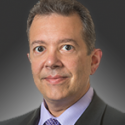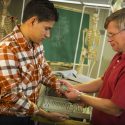Changing the face of science education

Beth Hutchinson (left), a neuroscience graduate student and teaching assistant, leads a study session with Senneca Di Tusa, a senior zoology major, in the Medical Sciences Center.
Photo: Aaron Mayes
When Trina McMahon arrived on campus as an assistant professor of civil and environmental engineering in 2003, she brought excellent research credentials — and absolutely no formal training in teaching or mentoring.
Far from unusual, McMahon’s experience reflects the traditional emphasis most graduate degree programs in sciences, engineering and math place on rigorous training in research skills and methods. However, ask any faculty member at a research university or college and you are likely to hear that research is only one of their many duties — duties that usually include teaching undergraduate and graduate courses, mentoring students, advising and providing service to the department or school.
McMahon recalls the difficulty of her first year as a professor. “People who make it this far make it because they are good at what they do, and they like to be good at what they do,” she says. Teaching classes and mentoring students — and doing them well — without any training in how to do so, she says, was “incredibly challenging.”
Fortunately for McMahon, UW–Madison is one of a handful of institutions of higher learning involved in a federal initiative to improve the quality of science, math and engineering higher education by engaging graduate students and faculty in the integration of research, teaching and learning.
Committed to Delta?
Delta is the flagship program of a multi- institutional initiative, CIRTL (Center for the Integration of Research, Teaching, and Learning), started four years ago by the National Science Foundation to improve college-level teaching of science, technology, engineering and math.
“UW–Madison has been a laboratory for developing and evaluating strategies to create current and future faculty who are superb researchers and superb teachers,” says Robert Mathieu, CIRTL director.
As Delta approaches the end of its federal grant, UW–Madison will continue the program with university funding.
“As a campus, we want to promote breadth of graduate student education,” says Patrick Farrell, provost and vice chancellor for academic affairs. “Though many students go on to careers that include teaching, graduate programs have not historically focused on preparing them for that aspect of their work. This program helps students learn to teach effectively while studying at a research-intensive institution.”
Beginning this fall, funding for the program will come from the provost’s office and the university’s schools and colleges, including the Graduate School, College of Engineering, College of Letters and Science, College of Agricultural and Life Sciences, and School of Education.
“The future of higher education rests on comprehensively training graduate students,” says Aaron Brower, vice provost for teaching and learning and former Delta co-faculty director. “Delta does not just provide a service for the campus — it is a part of what our campus stands for.
Through the UW Delta Program in Research,
Teaching and Learning, McMahon found instructional resources and support that helped her transition from full-time graduate researcher to faculty member. “It gave me the training I hadn’t gotten anywhere else,” she says.
Current graduate students and postdoctoral researchers face similar challenges as they prepare for the job market, says astronomy professor Robert Mathieu, co-faculty director of Delta. “Delta creates a learning community that helps future and current faculty members excel in teaching as they excel in their research.”
Linking research and teaching
Delta encompasses a variety of resources and activities open to graduate students, postdoctoral fellows, staff and faculty. While the events range from project-based classes and workshops to themed group discussions and roundtable dinners, all revolve around gathering diverse communities of people interested in improving teaching and learning.
Some graduate students pursue internships to work with faculty on specific projects, sometimes in conjunction with a teaching assistantship. These internships encourage young scientists to take skills honed in the lab and apply them to teaching, an idea participants call “teaching-as-research.”
“Research doesn’t have to stay in the lab with whatever experiments you’re working on,” says Matt D’Amato, a former materials science graduate student and Delta intern. “Research can also come into the classroom.”
Approaching teaching from a researcher’s perspective can help instructors analyze and improve student learning, D’Amato says: identify problem areas, develop experiments to address such areas and evaluate whether they worked.
Neuroscience graduate student Beth Hutchinson is completing a Delta internship this semester as a teaching assistant for an upper-level neurobiology course. She and physiology professor Tom Yin decided to introduce students to primary research literature, the formal and often dense academic papers that are a staple resource in any scientific profession and a common measure of research productivity.
“How much do components of classes help students approach literature?” asks Hutchinson. “It can be a scary, daunting task for undergrads, but it’s really important.”
Hutchinson developed assignments requiring students to read, analyze and discuss recent research articles on topics covered in lectures. Along with performance on the exercises, Hutchinson is collecting students’ self-assessment of their ability to work with research articles as well as the difficulty and value of the task.
Though final results won’t be in until the end of the semester, Hutchinson says even early feedback is useful. “It gives me insight into some of the things students put emphasis on.”
Delta internships benefit faculty as well, says engineering professor McMahon. She partnered with computer science graduate student Lisa Torrey, creating an online teaching tool to help introductory environmental engineering students develop crucial problem-solving skills. Though the project initially grew out of Torrey’s Delta internship, McMahon has continued to use the module every semester.
The “teaching-as-research” approach can lead to tangible benefits too, participants say. D’Amato published an article on his Delta internship project, integrating a multifaceted unit on fuel-cell technology into a traditional introductory chemistry class, in the Journal of Chemical Education this February. Also this spring, McMahon received a multiyear CAREER grant from the National Science Foundation in recognition of her dedication to teaching and research.
Preparation for the future
As some of the early student participants finish their graduate work and prepare to move on to faculty positions, they are finding that their activities in the Delta program speak loudly to job search committees.
Alysa Remsburg, zoology graduate student, is finishing her doctoral dissertation and applying for faculty positions at small colleges. When several schools requested a “teaching and learning portfolio” after selecting her as a top candidate, Remsburg was ready with a thick packet highlighting her dedication to undergraduate education and including materials she developed to help advanced biology undergraduates grapple with statistics and experimental design.
Still in the midst of interviewing, she is optimistic about her chances, even without having pursued postdoctoral research. She notes that her diverse experiences during graduate school have also given her a taste of what may lie ahead of her. “My adviser says that the experience juggling teaching, research, my own course work and service activities all at once is very much like the demands of a faculty position.”
UW–Madison and Delta alumna Sarah Titus is wrapping up her first year as an assistant professor of geology at Carleton College in Northfield, Minn. She credits the training she received through Delta with helping her land her current position.
“I was better able to communicate about teaching than I would have been before the programÉ I had always cared about teaching, but Delta provided a very systematic way to think about it,” she says. “I gained confidence in my teaching and in my research.”
And once she arrived at her new post, she adds, “I was able to hit the ground running.”
D’Amato echoes this sentiment. After finishing an internship with chemistry faculty at Madison Area Technical College (MATC), where he developed an online learning module and lab project about fuel-cell technology, he is now a science instructor, teaching chemistry at MATC and physics at Edgewood College.
“Delta gave me a foundation that I use in my courses — how to approach certain topics based on what we know about how students learn and the best methods for teaching those ideas,” D’Amato says. “My experience helped me start out a step ahead.”
Building communities
Physics graduate student Bret Underwood showed up for the first day of a Delta course last summer only to discover another physics student enrolled in the class — someone he had never seen.
“I looked at him and thought, ‘How did I not know you before?’” Underwood recalls.
Realizing the department lacked any way for people with teaching interests to connect, Underwood was inspired to create one. He started the Physics Teaching Forum, based on a Delta model, an informal monthly gathering of students, faculty and staff interested in improving physics education. The participants discuss issues encountered while teaching, or visit classes to observe other people’s teaching methods.
“The people in my department are a large community to support my research,” Underwood says. “Delta provides a community to develop the teaching aspect of becoming a faculty member.”
Although Delta has created a distributed network of people at UW–Madison, collaborations with MATC and Edgewood College forge broader connections as well.
"This type of project is essential to improve the quality of undergraduate teaching of science and mathematics to meet the challenge of producing a sufficient number of scientists and engineers in the future," says Edward Clarke, coordinator for grants and special projects at MATC and a member of the National Advisory Board for Delta's parent program, the Center for the Integration of Research, Teaching and Learning (CIRTL).
Two former Delta interns have returned to MATC to teach part-time — a win-in situation, Clarke says. "It is stimulating for our faculty to have young, energetic graduate students who bring a variety of skills and ideas and introduce new topics to our curriculum and the students get to teach their own courses, which is not something they would probably get at UW."
Delta has already drawn in more than 1,000 students, postdoctoral students and faculty, says co-faculty director Steve Ackerman, a professor of atmospheric sciences. The university’s decision to support the program with university funds will allow continued enrichment of both graduate and undergraduate education on campus.
“Graduate students are recognized as a driving force for research on campus,” says Mathieu. “Delta highlights the fact that these same students are a major force for shaping and improving our ability to educate our undergraduates.”
“Delta gives you the background that’s missing in most research training,” says D’Amato. “It’s something everyone in the program can take out with them. It’s not just something you add to your transcript.”
Tags: Graduate School, learning, outreach, teaching



